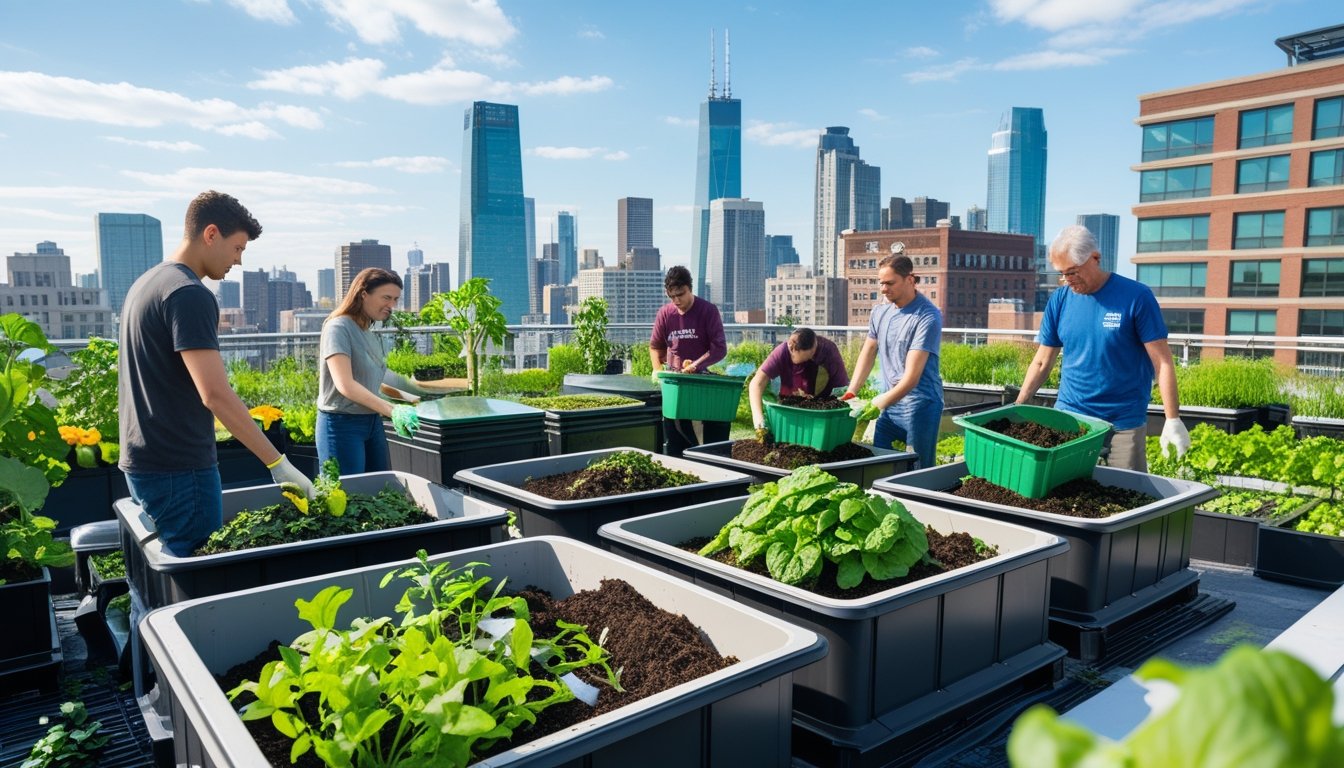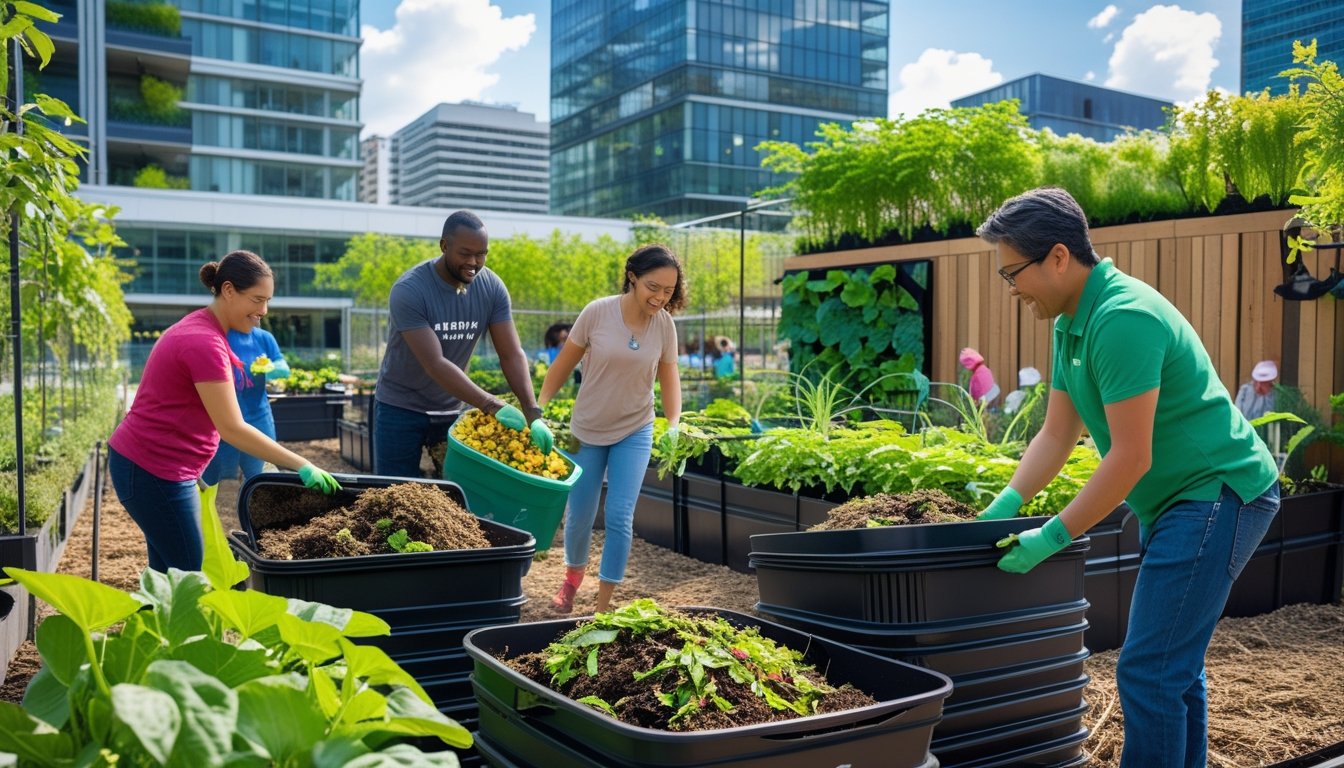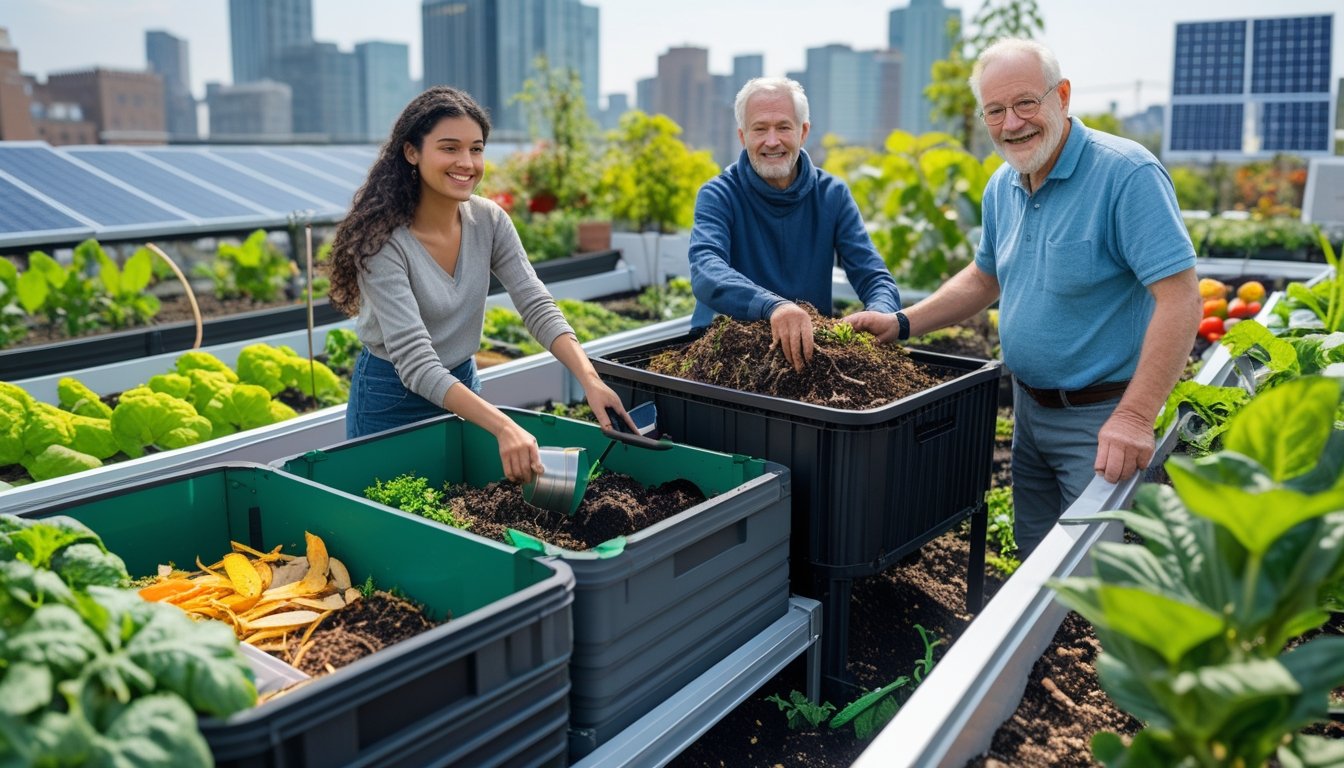Late updated: 15 Aug 2025 10:08
Written by: Sarah Hollister
Innovative Composting Solutions For Urban Areas: Transforming City Waste Management
Urban areas often face unique challenges when it comes to waste management, and composting can seem like an insurmountable task in crowded cities. Yet, the drive for environmental sustainability has fuelled the development of innovative composting solutions tailored for urban environments. Advancements such as Bokashi composting and compact electric composters are making it possible for city dwellers to efficiently turn kitchen scraps into valuable compost, even in limited spaces.

As urban populations continue to rise, the importance of managing organic waste sustainably becomes increasingly evident. Creative methods like vermicomposting and the use of food composter machines are particularly suitable for those of us navigating the fast-paced city life, allowing us to contribute positively to our environment. This movement is not only reshaping urban waste management but also fostering a sense of community involvement and responsibility.
For those who may not have personal access to composting options, community initiatives and neighbourhood compost cooperatives offer additional avenues for participation. These efforts help transform waste into a resource, supporting greener cities and healthier living environments.
Key Takeaways
- Urban composting solutions empower city dwellers to manage waste efficiently.
- Innovative methods like Bokashi and vermicomposting suit cramped spaces.
- Community initiatives enhance environmental responsibility and sustainability.
Innovative Composting Solutions Suitable for Urban Areas
Urban environments pose unique challenges for composting, yet they also inspire innovative solutions. From compact indoor systems to automated options, urban composting adapts to the constraints of modern city living. Let's explore several methods that transform kitchen waste into valuable compost, even in limited spaces.
Indoor Compost Bins for Apartments and Small Spaces
Indoor compost bins are an effective solution for those with limited outdoor space. Compact and odour-free, these bins are designed to fit into a kitchen corner or under a sink. They typically use carbon filters to reduce smells while ensuring air circulation required for decomposition.
For urban dwellers, indoor bins facilitate composting organic waste such as food scraps right at home. Many are made from recycled materials, and some even incorporate user-friendly features like liner bags for easy clean-up. These bins can significantly lower rubbish contributions to landfills. By choosing the right model, we can turn our organic waste into nutrient-rich compost without leaving our homes.
Vermicomposting: Worm-Based Systems in Urban Homes
Vermicomposting harnesses the natural process of using worms to break down organic matter. It's particularly suitable for urban areas where space is limited. Red worms, or Eisenia fetida, are commonly used in this method. Vermicomposting bins can be placed on balconies, patios, or even indoors.
This method effectively handles small amounts of kitchen waste like fruit peels and vegetable scraps. The results are impressively nutrient-rich, known as worm castings or vermicast, perfect for urban gardeners. Worm tea, a liquid byproduct, can also be used as a potent plant fertiliser. We find this method a fascinating way to contribute to waste reduction in urban areas.
Bokashi Composting Methods and Equipment
Bokashi composting stands out for its simplicity and efficiency. It uses a specific bran infused with beneficial microbes to ferment food scraps. The process is anaerobic, meaning it occurs without air, which allows it to work indoors without odours.
Bokashi systems are compact and often come as complete kits, including a bucket and bokashi bran. We appreciate this method for its ability to handle a wide range of food waste, including meat and dairy. After fermentation, the materials can be directly added to garden soil to further decompose, enriching it over time. It's an intuitive approach for urban composting.
Electric Composters and Automated Options
Electric composters offer a tech-forward approach to handling organic waste. These devices rapidly break down food waste using heat and agitation. As a result, they produce compost in a much shorter period than traditional methods. Many models are compact, making them a fit for city apartments.
Some electric composters require little maintenance—an appealing feature for busy urban residents. They often include user-friendly features such as digital controls and automatic processing. While the initial investment can be higher, the convenience and speed of these automated systems are compelling for those seeking efficiency and simplicity in composting.
Community Approaches and Practical Impact of Urban Composting

Urban composting presents a remarkable opportunity to enhance soil health, reduce waste, and strengthen community bonds. By tapping into shared compost hubs and integrating composting practices with urban agriculture, we can transform city landscapes into thriving ecosystems that produce nutrient-rich soils.
Community Composting and Shared Compost Hubs
Community composting initiatives enable urban residents to collaboratively manage organic waste, turning a potential problem into a valuable resource. These systems utilise shared compost hubs where citizens can deposit yard waste and kitchen scraps. They often employ methods like vermicomposting and hot composting to expedite the decomposition process.
Shared hubs motivate community participation and environmental stewardship. Such collective efforts lead to the efficient processing of organic waste into finished compost. This compost acts as a local solution to waste management, generating benefits including reduced landfill contributions and improved urban sustainability. In essence, by working together, we enhance our environment while fostering social cohesion.
Connecting Compost with Community Gardens and Urban Agriculture
Community gardens and urban agriculture link seamlessly with composting practices to create a more sustainable urban environment. The integrative approach allows urban garden plots to flourish as nutrient-rich compost enhances soil structure and fertility. We often see vegetables, herbs, and flowers thriving in these plots due to improved soil conditions.
Integrating compost systems with urban agriculture measures not only enhances crop yields but also promotes local food security. It encourages sustainable practices by returning organic waste to the soil, thereby closing the nutrient loop. Community involvement in these gardens and farms has the added benefit of educating residents about sustainable food practices, creating a sense of ownership and pride.
Soil Health and Nutrient Benefits in City Environments
Improving soil health in urban settings is crucial, and nutrient-rich compost plays a pivotal role in achieving this. The addition of compost enhances the soil's water retention, aeration, and structure, making it more fertile. Such improved conditions result in robust plant growth and healthier ecosystems.
Composting urban waste not only provides nutrients vital for plant health but also restores depleted urban soils. This process reduces the need for chemical fertilisers, promoting a more natural growing environment. By focusing on soil health, we effectively transform urban spaces into green, productive areas brimming with potential for urban agriculture and community gardens alike.
Frequently Asked Questions

Urban composting presents unique opportunities and challenges. By understanding and implementing innovative methods and engaging communities, we can transform waste management in city environments. Technological advancements and supportive local policies also play crucial roles.
What are the most efficient methods to implement composting in limited space environments?
In cities, space is often a constraint. Utilising compact solutions like balcony tumblers or vertical composting towers can make a significant difference. These systems are specifically designed to fit small areas while efficiently transforming waste into compost.
How can technology advance composting practices in high-density urban areas?
Technology can revolutionise urban composting. Smart composters with sensors and automated processes can make it easier for city residents to manage organic waste. These innovations streamline the composting procedure, making it more accessible and less time-consuming.
What community strategies can be adopted to promote composting in cities?
Communities can foster composting through initiatives such as local workshops, shared composting facilities, and compost cooperatives. Encouraging residents to participate not only decreases waste in landfills but also enhances urban biodiversity by creating healthier soil.
Which composting techniques are best suited to apartment living?
For apartment dwellers, wormeries and bokashi bins are particularly suitable. These methods are odourless and require minimal space. By using these techniques, residents can effectively transform kitchen scraps into valuable compost even in tight living spaces.
How can local authorities support sustainable waste management through composting?
Local governments can implement policies that incentivise composting, provide subsidies for composting equipment, and establish large-scale municipal composting facilities. Public awareness campaigns can also educate citizens about the benefits and ease of composting.
What role do worms play in urban composting systems?
Worms are key players in vermicomposting systems. They accelerate the breakdown of organic material, producing richer compost. In urban settings, wormeries offer a practical solution, as they are compact and effective, making them ideal for residential use in cities.
